Germany decides to leave history in the past and prepare for war
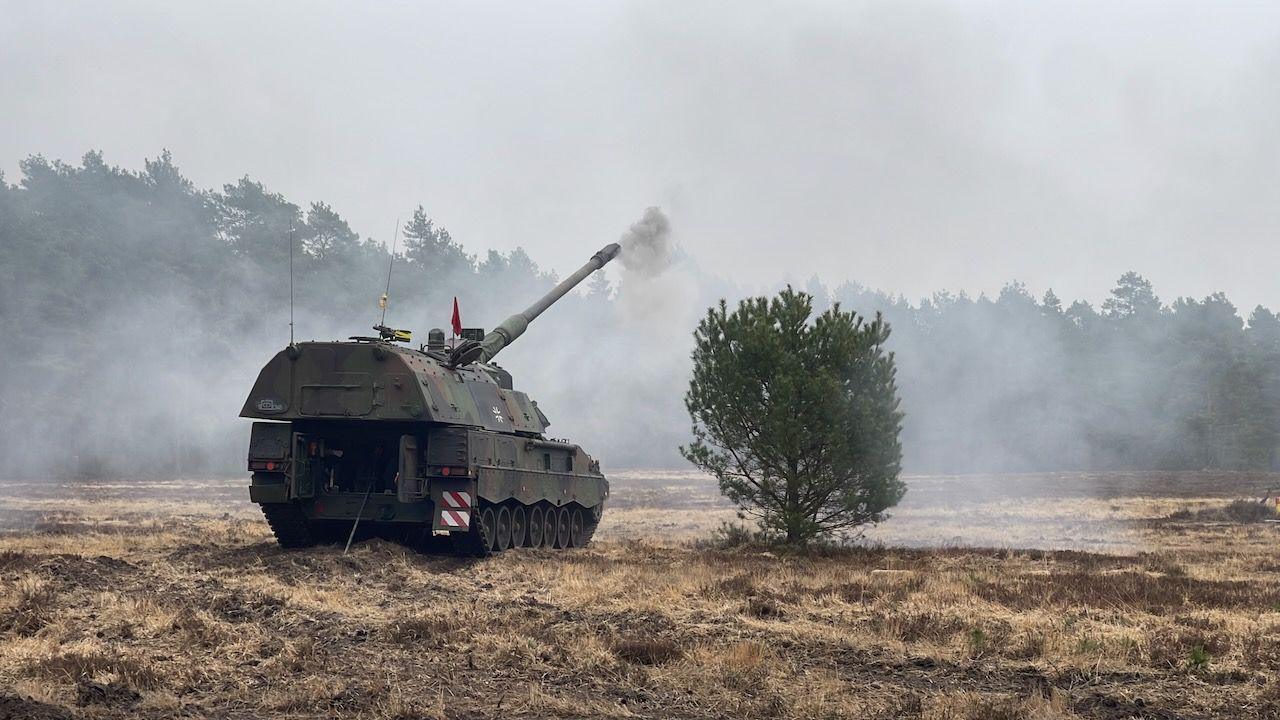
Germany has voted to hugely boost investment in its military
- Published
A missile launcher sends a cloud of brown dust into the air as it hurtles across a field towards the firing line. Moments later comes a soldier's countdown, from five to 'Fire!', before a rocket roars into the sky.
The blasts and booms from such military training exercises are so constant that locals in the nearby small town of Munster barely notice anymore.
But life here is set to get even louder.
Germany's military, the Bundeswehr, recently got the all-clear for a massive increase in investment after parliament voted to exempt defence spending from strict rules on debt.
The country's top general has told the BBC the cash boost is urgently needed because he believes Russian aggression won't stop at Ukraine.
"We are threatened by Russia. We are threatened by Putin. We have to do whatever is needed to deter that," Gen Carsten Breuer says. He warns that Nato should be braced for a possible attack in as little as four years.
"It's not about how much time I need, it's much more about how much time Putin gives us to be prepared," the defence chief says bluntly. "And the sooner we are prepared the better."
The pivot
Russia's full-scale invasion of Ukraine has changed thinking in Germany profoundly.
For decades people here have been raised on a rejection of military might, acutely aware of Germany's past role as the aggressor in Europe.
"We started two world wars. Even though it's 80 years since World War Two ended, the idea that Germans should stay out of conflict is still very much in many people's DNA," explains Markus Ziener of the German Marshall Fund in Berlin.
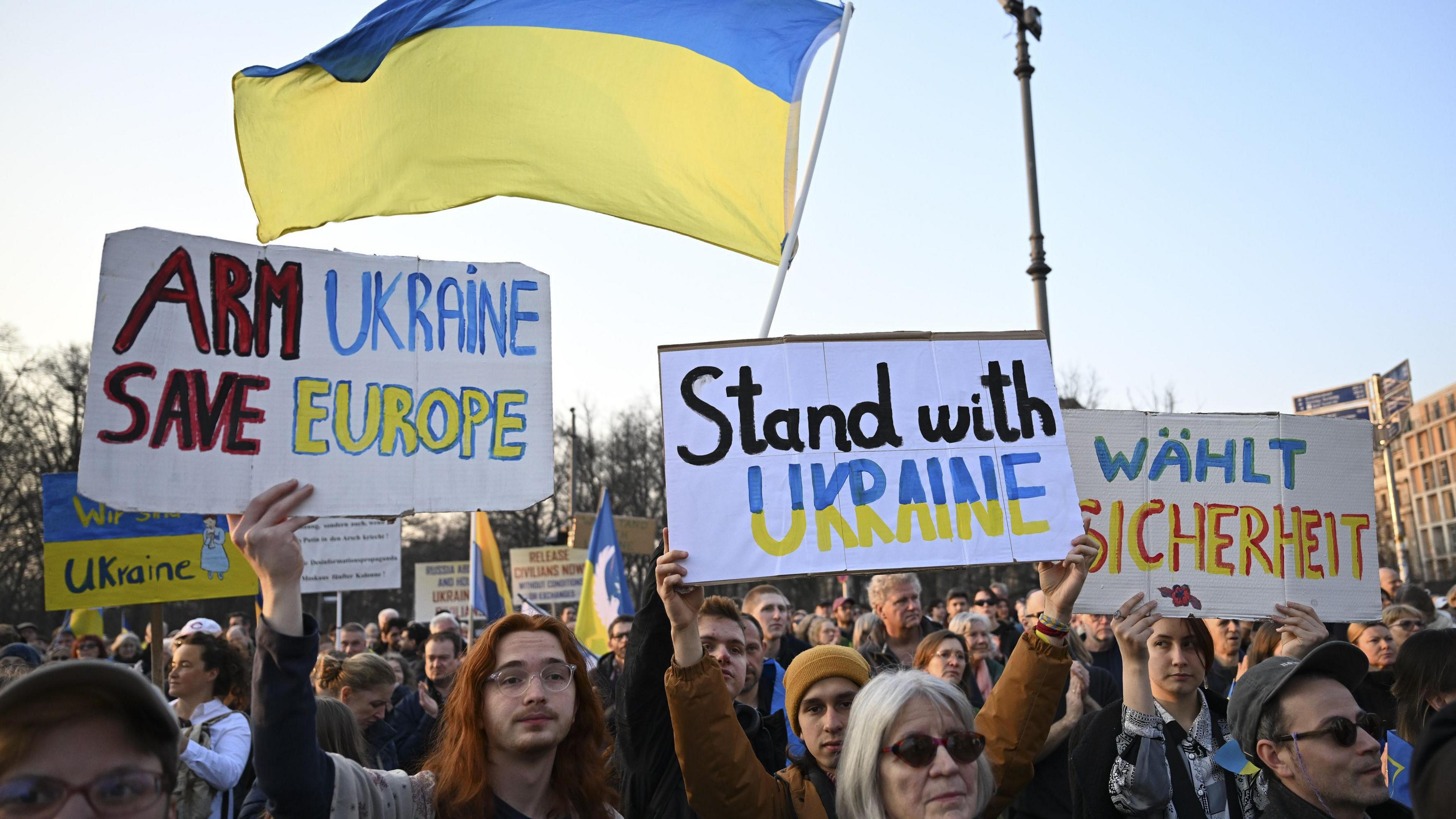
Russia's full-scale invasion of Ukraine has slowly started to change attitudes to war in Germany
Some remain wary of anything that might be seen as militarism even now, and the armed forces have been chronically underfunded.
"There are voices cautioning: 'Are we really on the right track? Is our threat perception right?'"
When it comes to Russia, Germany has had a specific approach.
Whilst countries like Poland and the Baltic States cautioned against getting too close to Moscow – and increased their own defence spending – Berlin under former Chancellor Angela Merkel believed in doing business.
Germany imagined it was delivering democratisation by osmosis. But Russia took the cash and invaded Ukraine anyway.
So in February 2022 a stunned Chancellor Olaf Scholz declared a national pivot in priorities, a "Zeitenwende".
That's when he committed a giant €100 billion ($108bn; £83bn) to boost the country's military and keep "warmongers like Putin" in check. But General Breuer says it wasn't enough.
"We filled up a little bit the potholes," he recounts. "But it's really bad."
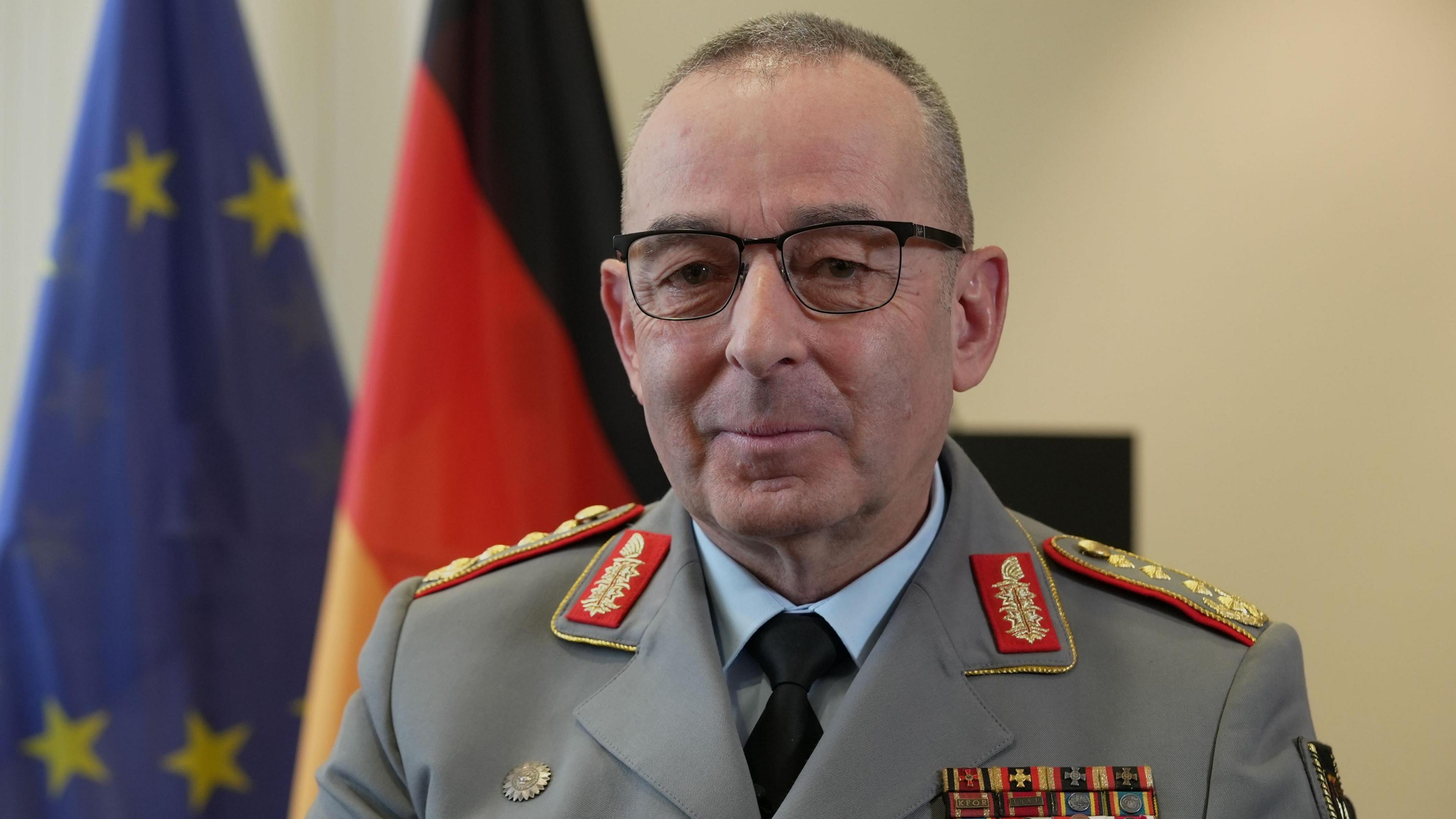
Gen Carsten Breuer thinks Germany will need to hugely increase troop numbers
By contrast, he points to heavy spending in Russia on weapons and equipment, for stocks as well as the frontline in Ukraine.
He also highlights Russia's hybrid warfare: from cyber attacks to sabotage, as well as unidentified drones over German military sites.
Add to that Vladimir Putin's aggressive rhetoric and General Breuer sees "a really dangerous mixture."
"Unlike the western world, Russia is not thinking in boxes. It's not about peacetime and war, it's a continuum: let's start with hybrid, then escalate, then back. This is what makes me think we are facing a real threat."
He argues Germany has to act fast.
'Too little of everything'
The defence chief's stark assessment of his forces' current state chimes with a recent report to parliament. The Bundeswehr, it concluded, had "too little of everything".
The report's author, armed forces commissioner Eva Högl, revealed dire shortages ranging from ammunition to soldiers, right down to dilapidated barracks. She estimated the budget for renovation work alone at around €67 billion ($72bn; £56bn).
Lifting the debt cap, allowing the military to borrow – in theory, without limit – will give it access to a "steady line" of funding to start to address that, General Breuer says.
The historic move was made by Scholz's expected successor, Friedrich Merz, in a rush that raised some eyebrows. He submitted the proposal to parliament just before it was disbanded following the February elections.
The new parliament, with an anti-militarist left and Russia-sympathising far right, might have been less favourably disposed.
But the "turn" that Germany started in 2022 gained fresh momentum this year.
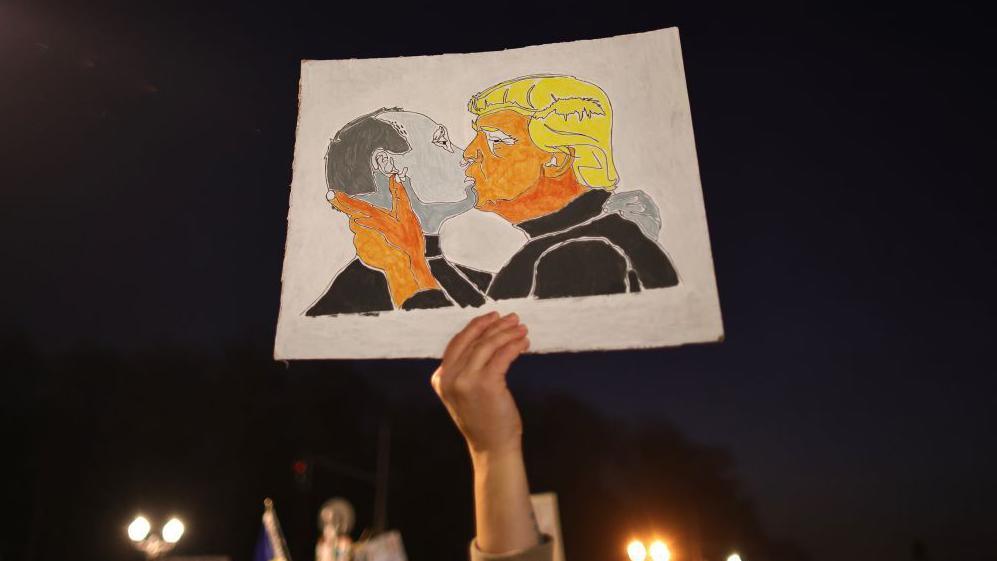
Germans are now increasingly suspicious of the presidents of both Russia and the US
A recent YouGov poll showed that 79% of Germans still see Vladimir Putin as "very" or "quite" dangerous to European peace and security.
Now 74% said the same for Donald Trump.
The survey followed a speech in Munich in which his Vice President JD Vance laid into Europe and its values.
"That was a clear signal that something fundamentally has changed in the United States," says Markus Ziener.
"We don't know where the US is heading but we know the belief that we can 100% rely on American protection when it comes to our security - that trust has now gone."
Leaving history behind
In Berlin, Germans' traditional caution about all things military seems to be fading fast.
Eighteen-year-old Charlotte Kreft says her own pacifist views have changed.
"For a really long time, we thought the only way to make up for the atrocities we committed in World War Two was to make sure it never happened again […] and we thought we needed to demilitarise," Charlotte explains.
"But now we are in a situation where we have to fight for our values and democracy and freedom. We need to adapt."
"There are lots of Germans who still feel strange about big investments in our military," Ludwig Stein agrees. "But I think considering the things that have happened in the past few years, there's no other real option."
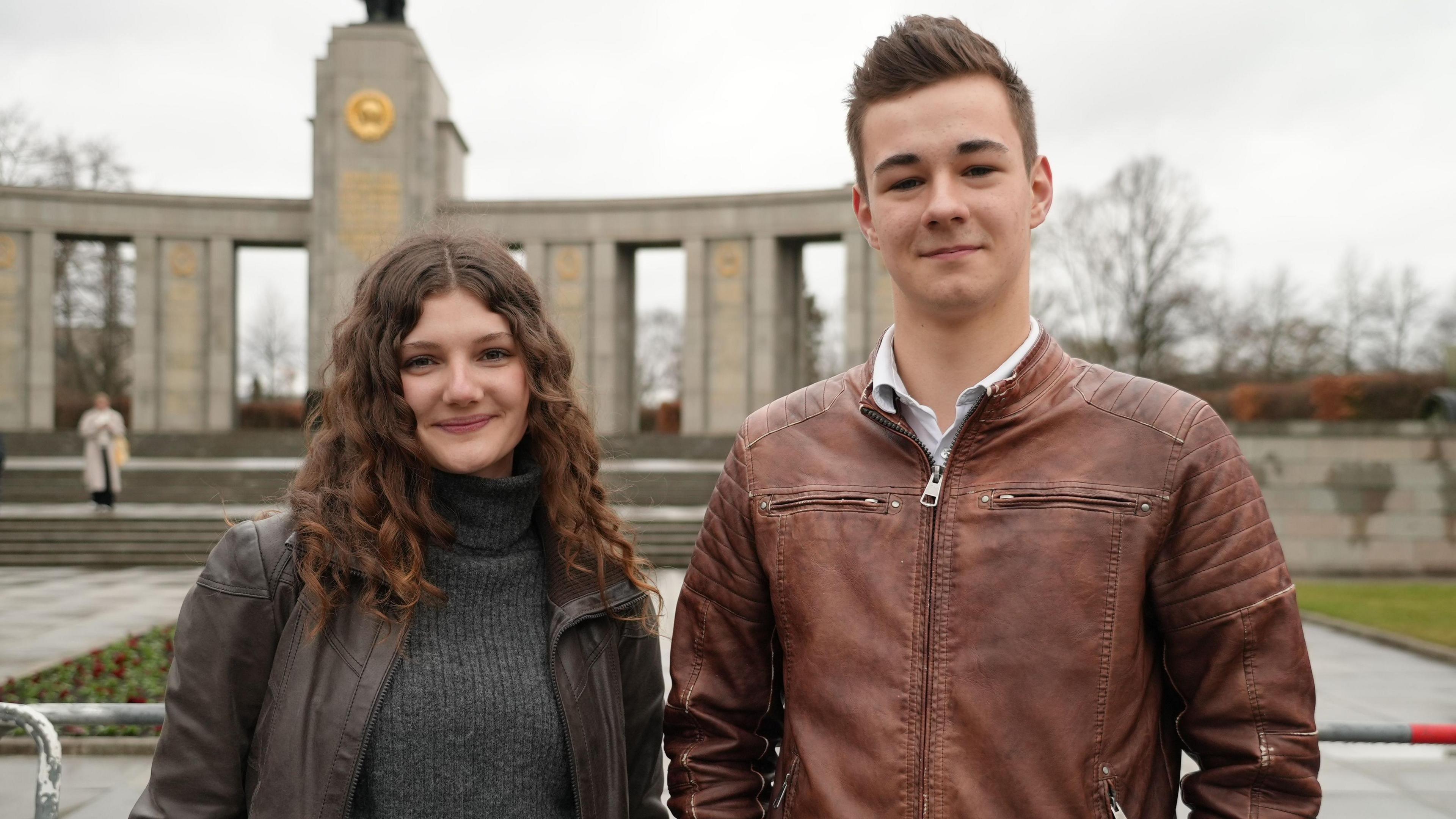
Charlotte and Ludwig see the need to boost defence spending in Germany
Sophie, a young mum, thinks investing in defence is now "necessary in the world we live in".
But Germany needs troops as well as tanks, and she's far less keen on her own son being enlisted.
'Are you ready for war?'
The Bundeswehr only has one permanent drop-in centre, a small unit sandwiched between a pharmacy and a shoe store beside Berlin's Friedrichstrasse station.
With camouflage-clad dummies in the window and slogans like "cool and spicy" it aims to attract men and women to serve, but only gets a handful of callers each day.
Germany has already missed a target of boosting its ranks by 20,000 soldiers, to 203,000, and lowering the average age from 34.
But Gen Breuer's ambitions are far greater.
He told us Germany needs an extra 100,000 troops to defend itself and Nato's eastern flank adequately - a total of 460,000, including reserves. So he insists a return to military service is "absolutely" necessary.

Germany had conscription for all men until 2011
"You won't get this 100,000 without one or other model of conscription," the general said.
"We don't have to determine now what model brings them. For me it's only important that we get the soldiers in."
That debate has only just begun.
General Breuer is clearly positioning himself at the front of an effort to push Germany's "turn" further and faster.
With his easy, engaging manner, he likes to visit regional town halls and challenge audiences there with a question: "Are you ready for war?"
One day a woman accused him of scaring her. "I said, 'It's not me scaring you, it's the other guy!'" he remembers his reply.
He was referring to Vladimir Putin.
The twin "wake-up" alarm – of the Russia threat and an isolationist, disengaged United States – is now ringing loudly for Germany, the general argues, and can't be ignored.
"Now it's understandable to each and every one of us that we have to change."